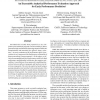Free Online Productivity Tools
i2Speak
i2Symbol
i2OCR
iTex2Img
iWeb2Print
iWeb2Shot
i2Type
iPdf2Split
iPdf2Merge
i2Bopomofo
i2Arabic
i2Style
i2Image
i2PDF
iLatex2Rtf
Sci2ools
115
click to vote
IPPS
2003
IEEE
2003
IEEE
An Executable Analytical Performance Evaluation Approach for Early Performance Prediction
Percolation has recently been proposed as a key component of an advanced program execution model for future generation high-end machines featuring adaptive data/code transformation and movement for effective latency tolerance. An early evaluation of the performance effect of percolation is very important in the design space exploration of future generations of supercomputers. In this paper, we develop an executable analytical performance model of a high performance multithreaded architecture that supports percolation. A novel feature of our approach is modeling interactions between software (program) and hardware (architecture) components. We solve the analytical model using a queuing simulation tool enriched with synchronization. The proposed approach is effective and facilitates obtaining performance trends quickly. Our results indicate that percolation brings in significant performance gains (by a factor of 2.7 to 11). Further, our results reveal that percolation and multithreadin...
Related Content
| Added | 04 Jul 2010 |
| Updated | 04 Jul 2010 |
| Type | Conference |
| Year | 2003 |
| Where | IPPS |
| Authors | Adeline Jacquet, Vincent Janot, Clement Leung, Guang R. Gao, Ramaswamy Govindarajan, Thomas L. Sterling |
Comments (0)

